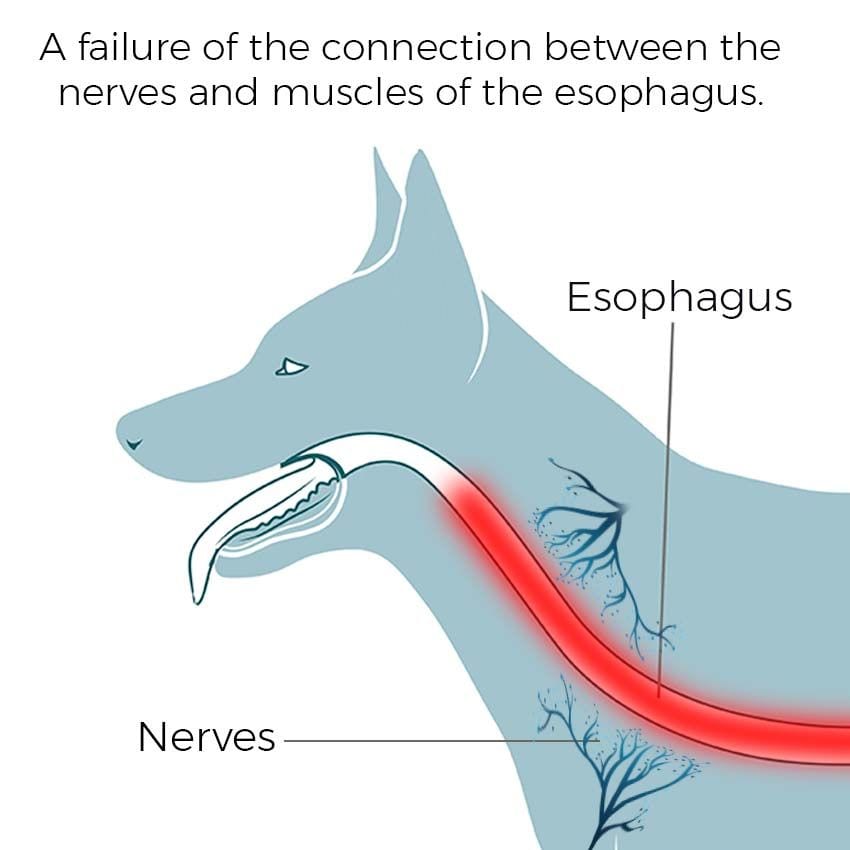WHAT IS MEGAESOPHAGUS?
Megaesophagus is an enlargement of the esophagus, the muscular tube that connects the throat to the stomach, with decreased (or even zero) motility. Motility in this instance refers to the esophagus’ ability to push food and liquid into the stomach. When this doesn’t happen food and liquid build up in the esophagus.
Megaesophagus is most often seen in humans, horses, cats and dogs. However, it is more common in dogs. Some breeds are born with this problem and some breeds are predisposed to the condition. Such as:
- Wire-Haired Fox Terriers
- Miniature Schnauzers.
- German Shepherds
- Dachshunds
- Great Danes
- Irish Setter
- Labrador Retriever
- Pug
- Chinese Shar-Pei
In horses, the Friesian breed is most commonly affected with Megaesophagus.

SYMPTOMS AND TYPES OF MEGAESOPHAGUS IN ANIMALS
Regurgitation is considered the trademark of megaesophagus. And aspiration pneumonia may be an issue due to the entrance of food or liquid into the lungs. Other common symptoms of Megaesophagus may include:

- Vomiting
- Cough
- Nasal discharge
- Increased respiratory noises
- Weight loss
- Extreme hunger or lack of appetite
- Excessive drooling
- Bad breath
- Poor growth
- Muscle weakness
In horses the majority of symptoms are the same as other animals but may also include:
- Difficulty swallowing
- Trouble drinking water
CAUSES OF MEGAESOPHAGUS IN ANIMALS
While some animals are born with Megaesophagus, others may develop it later in life. There is no known cause for the congenital form of Megaesophagus. Sometimes Megaesophagus is acquired and can occur secondary to another disease or condition such as:
- A failure of the connection between the nerves and muscles of the esophagus
- Degeneration or trauma in the brain or spinal cord
- A blockage of the esophagus by a foreign body, tumor, or scar tissue
- Severe inflammation of the esophagus
- Hormonal diseases like hypothyroidism or Addison’s disease
- Exposure to a toxin
- Esophageal tumor
- Foreign body in esophagus
- Inflammation of esophagus
- Parasitic infections
- Neuromuscular diseases like:
- Myasthenia gravis
- Distemper
- Myositis


WILL MAGNAWAVE HELP MEGAESOPHAGUS IN ANIMALS?
Most animals with Megaesophagus have to sit upright in order to eat, using gravity to help guide their food through the esophagus. Will MagnaWave help Megaesophagus? Well MagnaWave doesn’t treat any conditions. What MagnaWave does is provide energy to the body so it can better facilitate its own healing processes.
That said, if the esophagus is in such a state that the flexion and palpitation can help then MagnaWave could be beneficial to that type of condition. It is not going to change or heal the condition. MagnaWave works on the body, helps it provide energy and it will exercise the cells to the muscle soft tissue structure, which can help the body better take care of itself.
We recommend you talk to your veterinarian about what options are available and discuss MagnaWave with them. You may want to explain about the massaging and flexing effect of MagnaWave on the muscle tissue. Find out what the veterinarian’s thoughts may be, but MagnaWave might be a very complementary process to Megaesophagus in animals.
Sources:
https://www.petmd.com/dog/conditions/digestive/c_dg_megaesophagus
https://wagwalking.com/horse/condition/megaesophagus-friesian-

